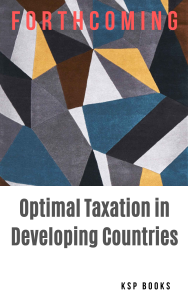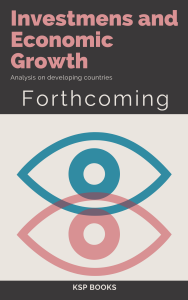Ethics and Malpractice
KSP Books is a double-blind, peer-reviewed publications. Since inception, the KSP Journals has been committed to delivering high quality research output and upholding high standards with respect to publication ethics and publication malpractice. In line with the Committee on Publication Ethics (COPE), the KSP Journals has developed the following criteria for all of the relevant parties involved in the entire publication process.
A. Our Ethical Guidelines
For the Editor:
1. The Editor shall not discriminate against any author based on race, religion, gender, age, ethnicity, political belief, sexual orientation, country of origin, etc.
2. The Editor shall remain committed to ensuring that all manuscripts are evaluated fairly and objectively; thus, the decision to accept or reject a manuscript shall be based solely on the paper’s importance, originality, and clarity, and the study’s relevance to the KSP Books.
3. In publishing special issues, the Editor shall keep in mind that the size of the contents, the number of papers, and their ratio to notes may be different from those of regular issues. Nonetheless, the review and revision process for all special issues will ensure that all submissions and associated materials are evaluated fairly and objectively, and the decision to accept or reject will be based solely on academic standards.
4. The Editor shall not disclose any information about any manuscript to anyone other than the author, reviewer, potential reviewer, arbiter, or editorial advisors.
5. For the smooth functioning of the KSP Books, in some exceptional situations, the Editor may make discretionary decisions, but in doing so, shall not deviate from the stated policy of transparency, fairness, and impartiality.
6. The Editor shall be ethically obligated to pursue any and all cases of alleged misconduct on the part of the author(s) or reviewer(s). The Editor shall (a) make all reasonable efforts to ensure that a proper and thorough investigation is conducted and (b) make all reasonable attempts to persist in obtaining a resolution to the problem.
7. Editor, tüm yazıları iThanticate ve Grammerly altyapıları üzerinden intihal denetimine tabi tutar. Editör, tespit ettiği intihal girişimlerini web sayfasından ilan eder. Yayın sürecinin diğer aşamalarında da tespit edilen intihal girişimleri Editör tarafından web sayfasından ilan edilir.
For the Reviewers:
1. Reviewers shall be objective and constructive in their evaluation of all manuscripts and return reviews within the proposed or mutually agreed time-frame.
2. Reviewers shall respect the confidentiality of peer review and not reveal any details of a manuscript or its review during or after the peer-review process.
3. Reviewers shall notify the Editor immediately of any misconduct on the part of any author(s) (e.g. plagiarism, tempering of data, or any other unethical activities).
4. Once a reviewer declares any potentially conflicting or competing interests (which may be personal, financial, intellectual, professional, political, religious, etc.), the reviewer shall be excused from reviewing any manuscript(s) of relevant interest.
For the Authors:
1. Authors shall take public responsibility for the content of their manuscript by submitting only original and unpublished works, by citing content reproduced from other sources, and by obtaining permission to reproduce content from other sources when applicable.
2. Authors shall confirm the authenticity of data used in the study and shall be obligated to provide the entire set of raw data to the editorial office for verification upon request.
3. Authors shall confirm that the manuscript has not been submitted simultaneously to any other publishing outlet.
4. Co-authors shall provide significant contributions in the data collection and/or writing process of an original manuscript.
5. Corresponding authors shall maintain consistent communication with all co-authors and shall be responsible for ensuring that all authors read and approve the final version of the manuscript.
6. Authors shall identify all funding sources pertaining to the research reported in the manuscript with written acknowledgement immediately following the conclusion of the related paper.
7. Authors shall ensure that studies involving human or animal subjects are carried out according to the relevant institutional, local, and internationally accepted guidelines (e.g. WMA Declaration of Helsinki, NIH Policy on Use of Laboratory Animals, EU Directive on Use of Animals), shall provide assurances that all research has been approved by an appropriate body (e.g. research ethics committee, institutional review board) where one exists, shall obtain written informed consent for publication from appropriate individuals, and shall protect the confidentiality of individual information obtained in the course of research.
8. Authors shall notify the managing editor or publisher promptly of any errors, inaccurate or misleading statements relative to one’s publication and shall make correction(s) with due prominence either by publishing an erratum, addendum, corrigendum notice, or by withdrawing the paper.
9. Authors shall declare any potentially conflicting or competing interest that could be considered or viewed as exerting undue influence on his or her duties at any stage during the publication process.
For the Publisher:
1. KSP Books publication process shall always remain sound and solid and shall comply with the standards outlined above.
B. Our Policy Regarding Malpractice
1. As soon as any alleged misconduct or unethical behaviour on the part of any author(s) or reviewer(s) comes to the attention of the editorial office, the Editor shall immediately begin a proper and thorough investigation. The accused shall be given an adequate opportunity to defend his/her actions and explain his/her position. Based on the available evidence, if it is ascertained that the breach is minor, the Editor shall give to the accused a written stern warning not to repeat the infraction in the future.
2. However, if the breach is determined to be of a serious nature, then the Editor shall inform the editorial advisors within the KSP Books and a proper and thorough investigation will commence. The accused shall be given an adequate opportunity to respond to any allegation(s) of wrong doing. Based on available evidence, if the accused is found to be guilty of misconduct, then, in addition to a stern warning note, the employer of the accused shall be notified about the incident and/or the wrongdoer shall be permanently placed on a blacklist with regard to the KSP Books.
3. Alternatively, in the event that the available evidence does not lead to a finding of wrongdoing, the accused will be notified in writing of the conclusion of the investigation.
4. In dealing with ethical breach, the KSP Books shall not discriminate against any accused based on race, religion, gender, age, ethnicity, political belief, sexual orientation, country of origin, etc. All allegations shall be taken seriously and treated in the same manner until a final decision or definitive conclusion is reached.
5. The investigation process shall be carried out in such a way that details of the incident do not spread beyond those individuals with a need to know.


































